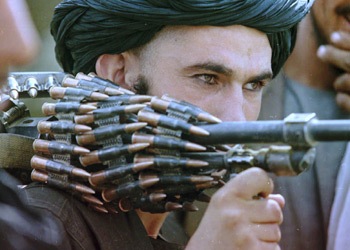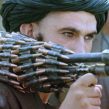Afghanistan: Forgetting the Lessons of History
Publication: Terrorism Focus Volume: 4 Issue: 4

Afghanistan is again being lost to the West. The insurgency may drag on for many months or several years, but the tide has turned. Like Alexander’s Greeks, the British and the Soviets before the U.S.-led coalition, inferior Afghan insurgents have forced far superior Western military forces onto a path that leads toward evacuation. What has caused this scenario to occur repeatedly throughout history?
In the most general sense, the defeat of Western forces in Afghanistan occurs repeatedly because the West has not developed an appreciation for the Afghans’ toughness, patience, resourcefulness and pride in their history. Although foreign forces in Afghanistan are always more modern and better armed and trained, they are continuously ground down by the same kinds of small-scale but unrelenting hit-and-run attacks and ambushes, as well as by the country’s impenetrable topography that allows the Afghans to retreat, hide and attack another day. The new twist to this pattern faced by the Soviets and the U.S.-led coalition is the safehaven the Afghans have found in Pakistan. This is the basic answer to why history has found so many defeated foreign armies littering what Kipling called Afghanistan’s plains.
The latest episode in this historical tradition has several distinguishing characteristics. First, Western forces—while better armed and technologically superior—are far too few in number. Today’s Western force totals about 40,000 men. After subtracting support troops and NATO contingents that are restricted to non-combat, reconstruction roles—building schools, digging wells, repairing irrigation systems—the actual combat force that can be fielded on any given day is far smaller, and yet has the task of controlling a country the size of Texas that is home to the highest mountains on earth.
Second, the West underestimated the strength of the Taliban and its acceptability to the Afghan people. When invading in 2001, the West’s main targets were Osama bin Laden, Ayman al-Zawahiri, Mullah Omar and their senior lieutenants, and because the operation specifically targeted a group of top leaders, the Afghanistan-Pakistan border was not sealed and so not only did the pursued troika escape, but so did most of their foot soldiers. Those escapees are now returning in large numbers, and are better armed, trained and organized than upon their exit. It seems likely, in fact, that the force being fielded by the Taliban and its allies—al-Qaeda, Gulbuddin Hekmatyar, Jalaluddin Haqqani, among others—is at least equal in number to the coalition (al-Jazeera TV, March 2). Furthermore, the membership of force is not just a few Taliban remnants and otherwise mostly new recruits; rather, they are the veteran fighters that the coalition failed to kill in 2001 and early 2002. The Taliban forces are not new; they are the seasoned, experienced mujahideen who are—like Nixon in 1972—tanned, rested and ready to wage the jihad.
Western leaders in Afghanistan are also finding that many Afghans are not unhappy to see the Taliban returning. Much of the reason lies in the fact that the U.S.-led coalition put the cart before the horse. Before the 2001 invasion, the Taliban regime was far from loved, but it was appreciated for the law-and-order regime it harshly enforced across most of Afghanistan. Although women had to stay home, few girls could go to school and the odd limb was chopped off for petty offenses, most rural Afghans could count on having security for themselves, their families and their farms and/or businesses. The coalition’s victory shattered the Taliban’s law-and-order regime and instead of immediately installing a replacement—for which there were not enough troops in any event—coalition leaders moved on to elections, implementing women’s rights and creating a parliament, while the bulk of rural Afghanistan returned to the anarchy of banditry and warlordism that prevailed before the first Taliban era (Kabul Weekly, May 31, 2006). Making matters worse was the fact that many of the actions the coalition did successfully undertake—especially elections and women’s rights—added to the misery of rural Afghans by appearing to be attacks on millennia-old social, tribal and religious mores (Eqtedar Weekly, June 3, 2006). Faced with the reality of being in the thrall of Afghan criminals, and perceiving their culture to be under attack, it is not surprising that the Taliban is finding at least a tepid welcome home.
The third problem for the coalition is the amount of time it has spent in Afghanistan. Now in the sixth year of occupation, Western leaders are confronted not only by a stronger-than-2001 enemy, but also by the resurgent insularity and anti-foreign inclinations of the Afghan people. While not precisely xenophobic, the Afghans are historically hospitable and protective to a fault of visiting foreigners whom they have welcomed—witness their treatment of bin Laden—but have precious little tolerance for foreigners who, by intention or default, seek to rule them. Today, the Afghans perceive themselves to be doubly ruled, and doubly badly ruled, by foreigners: the U.S.-led coalition and the pro-Western, nominally Islamic, detribalized and corruption-ridden government of Hamid Karzai (Rah-e Nejat, February 27). This perception of a “foreign yoke,” along with spreading warfare, little reconstruction and endemic banditry, has created a fertile nationalistic environment for the Taliban and its allies to exploit.
Finally, the U.S.-led coalition now faces the full brunt of a new era that was started by the prolonged and brutal Soviet occupation and its consequent jihad. Long on the periphery of Islam—almost a backwater—Afghanistan became part of the Muslim world’s consciousness during the Afghan-Soviet war. The war focused Muslims and especially Arab Muslims on the plight of their Afghan brethren and prompted them to send large amounts of money and arms, as well as fighters to support the mujahideen. The Afghans repaid this assistance by defeating the Red Army, thereby giving the Islamic world its first victory over “infidel” Western forces in several hundred years. The Afghans’ victory was the turning point, and the totem for the maturing of a well-defined worldwide Islamist militant movement.
Today, many non-Afghan Muslims again perceive that the Afghans are being occupied and tortured by another infidel entity, the U.S.-led coalition. This is especially the case because the Afghan war is occurring in tandem with the Iraq war, which broadens the sense that all of Islam is under infidel attack. As a result, the flow from abroad of funds, arms and fighters to the Afghan insurgents—while probably not as large as the flow to the Iraqi resistance—is substantial, and can be seen in the improving combat performance of the Taliban-led forces confronting coalition forces. Also suggesting this connection are the successful efforts to share expertise across the two theaters, with Iraq war skills in suicide attacks and Improvised Explosive Devices being brought to bear in Afghanistan, while the Afghans’ well-honed skills in attacking helicopters are emerging as part of the Iraqi insurgents’ tool kit.
The future for the West in Afghanistan is bleak, and it is made more discouraging by the fact that much of the West’s defeat will be self-inflicted because it did not adequately study the lessons of history. “Efforts to occupy and rule [Afghanistan] usually ended in disaster,” wrote the eminent British historian Sir John Keegan in the Daily Telegraph in September 2001. “But straightforward punitive expeditions…were successful on more than one occasion. It should be remembered that, in 1878, the British did succeed in bringing the Afghans to heel [with a punitive expedition]. Lord Roberts’ march from ‘Kabul to Kandahar’ was one of Victoria’s most celebrated wars. The Russians, moreover, foolishly did not try to punish rogue Afghans, as Roberts did, but to rule the country. Since Afghanistan is ungovernable, the failure of their efforts was predictable…America should not seek to change the regime, but simply to find and kill the terrorists. It should do so without pity.”




